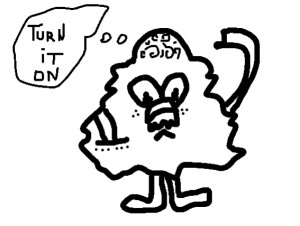 Most of the times when I use applied improvisation in a workshop I challenge people to either build a story (to tell it) or a scene (to act it). The purpose behind the activities is related to developing certain skills, but the purpose in the foreground is for them to build a good story or scene.
Most of the times when I use applied improvisation in a workshop I challenge people to either build a story (to tell it) or a scene (to act it). The purpose behind the activities is related to developing certain skills, but the purpose in the foreground is for them to build a good story or scene.
What I noticed over and over is that people have difficulties in giving details, in making things happen in their stories – which affects the quality of the story itself. They would be in a forest and they’ll go on saying: “now we’re walking, and we see something between the trees, and we walk towards it and when we approach it, it runs away…”. I ask them to describe in details a monster they meet and they’d say it’s something “so big, and scary, and gross and frightening and it stinks really bad”.
I almost never hear someone being in a forest, walking and then seeing a big hungry bear coming towards them. I almost never hear someone actually staying to fight the bear, not just with a “weapon”, but with a sharp silver sword earned at a carnival. I almost never hear someone actually winning or actually losing the battle. Most people would probably run away after a bit of fighting throwing desperate looks hoping I’ll call “freeze” and stop the scene.
I remember Keith Johnstone mentioned this once in his workshop – that beginner improvisers are always scared to make things happen.
This bugged me. Why aren’t my participants more specific? From debriefing we came up with a list of possible reasons:
- people are afraid not to be judged by their choice (Fighting a bear with a sword can be interpreted as cruelty to animals. And a sword could be a phallic symbol. Do we really do that when reading a book or are we just enjoying the adventure?)
- people struggle too much to be original and they can’t settle on the best choice so they paralyse (A bear in a forest – pff, it’s so obvious, anyone could think of that. How is “a very big scary something” better?)
- people think they are not creative so they just give up and don’t focus (“So…how should I know?…it’s something there…I don’t know…it’s…big”. You don’t need “creativity”, you simply need to make some connections out of things you already know).
From those three, which are inter-connected, we can name some more, mostly fears: not to seem stupid, or too childish, or too serious and so on. We censure ourselves at an unconscious level. It’s like the brain learned that one’s own imagination is a bad thing. It runs away from it. It shuts it down.
For different reasons, it seems like grown-ups end up being afraid of their own imagination.
I don’t think that our imagination is scary. I think it helps us have more fun, solve problems, keep our mind trained, feel less lonely even when we are alone, create and build things, communicate, be more in touch with ourselves, more aware of who we are.
So like any phobia that makes us struggle in our life we should treat ourselves from this imaginophobia.
Take a piece of paper and write a short story, describe in your head the soulmate of the person sitting next to you in the subway, draw a really ugly monster (saw mine? no talent needed), come up with as many uses as you can for a random object (blanket, go!), think of what a 3 year old would answer to questions about life (Why do eskimos choose to remain at the North pole? Maybe they guard a treasure?), take some improv classes…
Expose yourself bit by bit to your imagination until you grew out of the fear of it. Let it be free, and you’ll be free to be more of who you are!


Leave a Reply